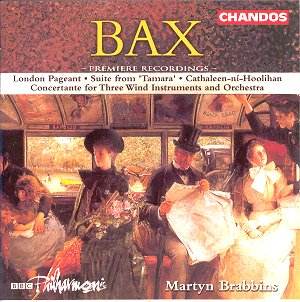Arnold BAX (1883-1953)
London Pageant (1937)
Concertante for cor anglais, clarinet, horn and orchestra
(1948-9)
Suite from Tamara
(1911)
Cathaleen-ní-Hoolihan
(1903)
 Gillian Callow (cor
anglais); John Bradbury (clarinet); Jonathan Goodall (French horn)
Gillian Callow (cor
anglais); John Bradbury (clarinet); Jonathan Goodall (French horn)
BBC Philharmonic Orchestra/Martyn Brabbins
rec Studio 7, BBC, Manchester, 17 May 23 June 2000
DDD
 CHANDOS CHAN 9879
[74.33]
CHANDOS CHAN 9879
[74.33]
Crotchet
Amazon
UK
Amazon
US

Gradually all Bax's music, (with the exception of the bulk of his songs)
is finding its way onto CD and it was with some personal delight that I seized
first here on the early tone poem Cathaleen-ni-Houlihan - a
supremely lovely evocation of a young man's fervid enchantment with the romantic
mysteries of the Isles of Youth - vintage Bax, stemming from an early youthful
String Quartet (but even earlier from a two violins and piano piece, played
by Eve Bax and Gladys Lees at a family concert at Ivy Bank in November 1904
- Arnold's twenty first birthday) a setting difficult to imagine given the
ultra-romantic lushness of the orchestral version!
This exciting disc opens with the 1937 London Pageant - a
ceremonial and colourful march, nearer perhaps to Eric Coates than to Elgar
or Walton, despite its darker side - as if the marchers were shadowed Machen-like
by ancient warriors! The peroration, backed by the massive power of the organ,
is impressively Gothic.
Another late work, the Concertante for three solo winds - a kind of
amalgam of three linked concerto movements - is an immediately attractive
commission in memory of Sir Henry Wood. The four movements - three given
in turn to cor anglais, clarinet and horn, the fourth a joyful coalition
- are marked, despite the opening elegy (which the composer indicated recalled
the tragic loves of Sarah Curran and Robert Emmett) with the characteristic
serenity of Bax's late compositions, with none of the cataclysmic power of
the first six symphonies. This mood is quickly banished with the brisk 'oompah'
of the strings and the grotesque clarinet solo in which Bax seems almost
to dwell on the instrument's less lyrical attributes. A dark string background
underpins the reflective horn solo - Bax in nostalgic mood, the horn calls
summoning ... what? Perhaps a last glance at those isles of the West. The
final movement in which all join with their own personal gloss on the music
suggest that, beneath the apparent pageantry, the merriment is somehow haunted
by the past. But with a shrug of the shoulders Bax introduces a cheerful
bubbling theme, which after a series of variations, ends with a cheeky gesture.
Following this, the dire opening gestures of the Prelude to the long forgotten
ballet "Tamara" (which Bax withdrew when the Ballets Russes produced
Balakirev's 'Thamar' in 1912) transports us to another world. The title was
changed to 'King Kojata', but it was never orchestrated. It has now been
superbly realised by Graham Parlett who, in line with Bax's other theatrical
scores of the period, has produced a score vibrant with colour, every bit
as vital as the music of Rimsky-Korsakov and Borodin. There are moments of
exquisite frisson - the opening of the Prelude: the first ethereal chords
of Naiads - a young man's music which leaves me wondering what other magical
excerpts Dr Parlett had to leave - enough for another Suite perhaps?
Colin Scott-Sutherland
See also review by Rob Barnett

